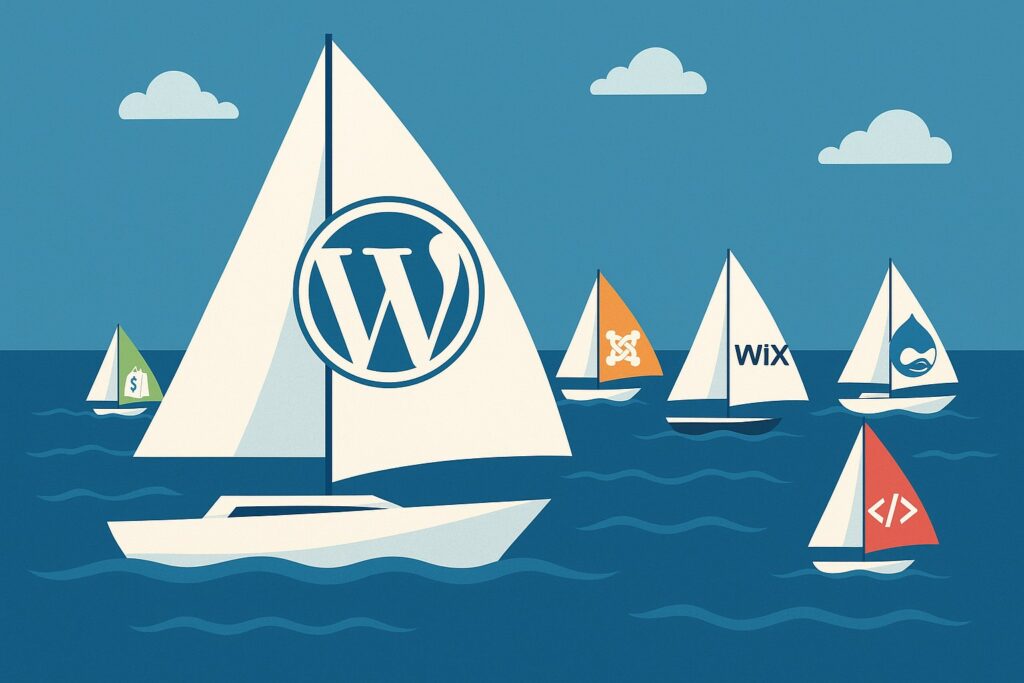For over 20 years, WordPress has dominated the world of website creation. But in 2025, with the rise of no-code tools, headless CMS, modern JavaScript stacks, and generative AI, can we still say WordPress is the best solution for building a website? Here’s a clear and updated analysis.

Why WordPress remains essential
1. A massive and vibrant community
With over 40% of the web powered by WordPress, its ecosystem is unmatched:
- thousands of free and premium plugins,
- extensive documentation,
- a huge knowledge base,
- easy access to WordPress developers and freelancers worldwide.
2. Unmatched flexibility
With tools like ACF, CPT UI, Elementor, Divi, WooCommerce, or Gutenberg, WordPress lets you build:
- a blog or media site,
- a corporate website,
- an online store,
- a booking platform,
- a community portal,
- an intranet,
- an LMS, and more.
3. Great freedom-to-cost ratio
Unlike SaaS solutions, WordPress is free, self-hosted, and doesn’t take a cut of your sales. You have full control over infrastructure, SEO strategy, monetization, and user experience.
WordPress limitations in 2025
1. Performance can be improved
Without optimization, a WordPress site can be slow, especially with many plugins or a heavy theme. You’ll need to:
- use quality hosting,
- set up caching,
- optimize images,
- reduce unnecessary plugins.
2. Possible technical debt
Outdated plugins, version conflicts, manual updates… WordPress isn’t magical. It requires technical discipline and ongoing maintenance.
3. Uneven admin experience
Despite Gutenberg and Full Site Editing, the native editing experience is still less fluid than that of Webflow, Wix Studio, or Shopify. Non-technical users may feel lost without training or a custom admin interface.
When is WordPress still ideal?
| Project Type | Is WordPress a good fit? | Why? |
|---|---|---|
| Freelancer or small business website | Yes | Quick to launch, good for local SEO, easily customizable |
| Blog or media site with SEO strategy | Yes | Built-in content management, powerful SEO plugins |
| Customized online store | Yes (with WooCommerce) | Scalable, strong support for variations, taxes, and currencies |
| Community platform or portal | Yes, with plugins | BuddyPress, bbPress, MemberPress, etc. |
| Web app or complex business logic | Not recommended | Better to use a framework (Laravel, Next.js) or a headless solution |
Serious alternatives to WordPress in 2025
- Webflow: for visually driven, high-end showcase websites.
- Shopify: for ecommerce focused on performance, UX, and international sales.
- Sanity / Payload / Strapi: for a powerful headless CMS.
- Laravel / Next.js: for custom apps or backend platforms.
Conclusion: WordPress, still a safe bet
In 2025, WordPress remains the most versatile, accessible, and scalable solution for a wide variety of web projects. It has flaws, but they are well-known, documented, and manageable.
It’s a solid foundation, especially for:
- launching quickly,
- testing a concept,
- retaining ownership of your data and code,
- building a SEO-friendly and personalized site.
Want to know if WordPress is right for your project? Contact us for a free audit or try our upcoming interactive web tech assistant!
All our guides for Website’s creation:






